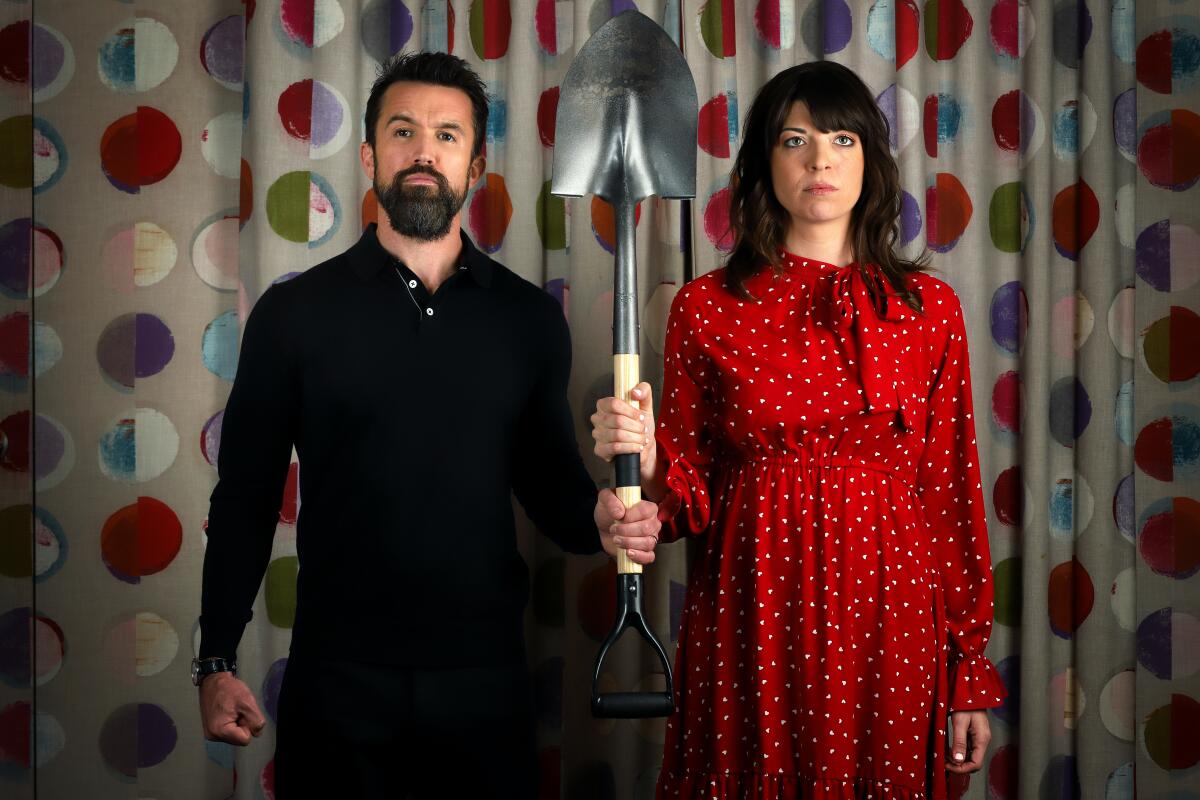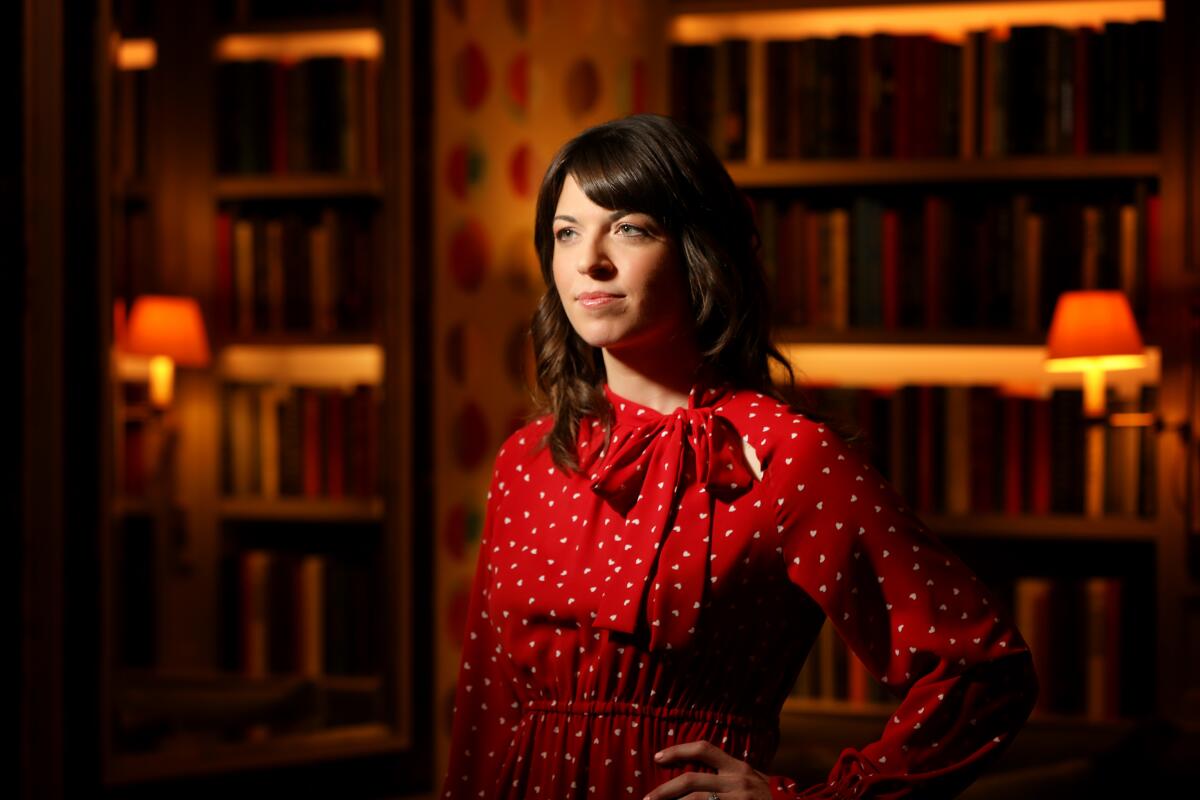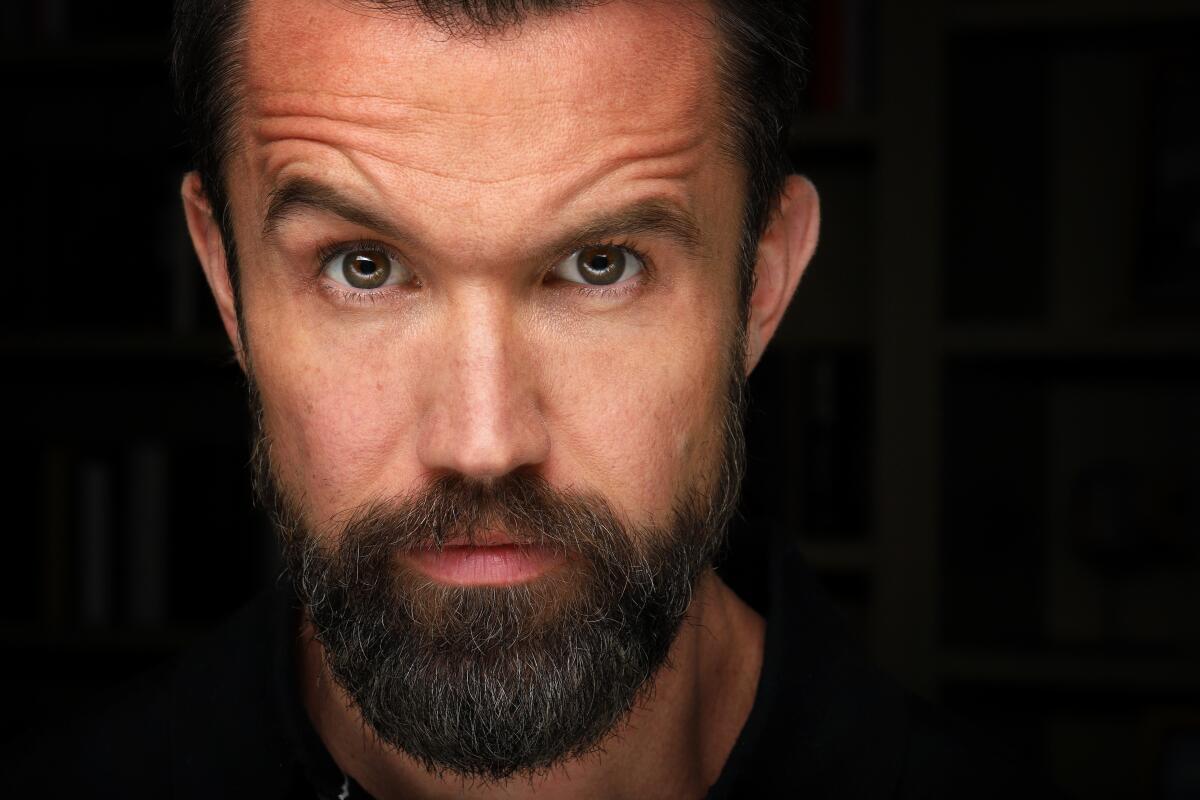Have a love-hate relationship with game culture? ‘Mythic Quest’ is the show for you

- Share via
The opening moments of “Mythic Quest: Raven’s Banquet,” now streaming on Apple TV+, put the spotlight on the video game industry’s inferiority complex.
A trailer for the show’s fictional game launches the series, boasting about the medium’s importance as much as it does the product it aims to sell. Global gaming revenue, the hyperbolic game teaser argues, towers over other forms of pop art.
Then the clip zeroes in on Ian Grimm, the game developer portrayed by showrunner and actor Rob McElhenney. Here, the voiceover echoes a long-standing insecurity of the gaming industry, which hasn’t always been taken as seriously as its cinematic peers. “When we think of visionary, world-building artists, instead of just Spielberg, Lucas and Cameron, why not think Grimm?”
“Mythic Quest” spends the next 30 minutes unpacking exactly that, bringing into mainstream discourse a phrase from the game universe: TTP, or “time to penis,” a reference to how quickly a player will use game development tools, in this case a shovel, to craft digital genitalia.
“In ‘Red Dead Redemption’ they have a thing where if you walk through snow your footsteps stay where you’ve gone,” says writer and co-creator Megan Ganz. Players, she notes, were retracing their steps to create a giant snow phallus. “I think that’s just representative of humanity. Humanity as a concept is neither comic nor tragic.”
“Mythic Quest” draws its humor from the tension between the grand artistic ambitions and pomposity of video game studios on one hand — “Assassin’s Creed” developer Ubisoft, a producer on the show, describes itself as “a creator of worlds” — and, on the other, the adolescent streak present in both games and their communities.
The series, from the minds behind “It’s Always Sunny in Philadelphia,” isn’t shy about mining comedy from the problems that plague the video game industry. For one, the business is largely comprised of men. For another, the long hours, among other issues, have fueled talks of unionization. Both topics figure heavily in the second half of “Mythic Quest’s” first season.
But the satire isn’t reserved for those who create the games. It’s also aimed at those who play them. For instance, when the fictional developers in the show await a critic’s verdict on an expansion to their game, “Mythic Quest: Raven’s Banquet,” it’s not a famed elitist they turn to. It’s a 14-year-old kid with a prominent YouTube channel who rates games in terms of number of “buttholes.”
“It’s obviously profane, silly and juvenile that you would rate video games based on b-holes,” says McElhenney. “But what I think is ultimately funny about it is not that grown adults are saying butthole. It’s that ultimately this billion-dollar enterprise rests on the shoulders of a reviewer who is a 14-year-old boy who has reduced their life’s work down to this rating system. It’s inherently sad, tragic and hilarious.”
Those with any knowledge of game design — or even a cursory understanding of how a human resources department functions — will find that much is exaggerated for comedic effect in the series. “Mythic Quest,” which has already been green-lighted for a second season, is a workplace comedy first, and a peek behind the video game curtain a distant second. Yet when the show finds its groove, it does so by zeroing in on subject matter that is very much a part of the video game conversation.

When a “Mythic Quest” executive played by David Hornsby asks one of the company’s two female coders to describe being a woman in tech, Aparna Nancherla’s character, Michelle, responds, “Which part did you want me to talk about? The part where you have to work twice as hard to make less money or the part where you can’t get ahead because it’s a bro mono-culture?” A look of dread and panic shoots across Hornsby’s face as he aims to steer the conversation back to something more inspirational, to which Michelle fires back, “Maybe you want to talk about what it’s like to be a female in a male-dominated field?”
Although the moment rings true — a recent developer survey found the game industry was 75% male — Ganz says they want to find humor in the stress that comes from a culture going through a transitional phase. Comedy can come from awkwardness, she explains, but “we are not making it seem like we’re saying that it’s really funny that women have been kept out of those industries.” As McElhenney adds, “The intention is to skewer the misogyny and the misogynist.”
If McElhenney, Ganz and fellow co-creator Charlie Day succeed, it’s because they embrace topical issues — everything that is beautiful, messy and ugly about the game universe — even as their goal is laughs rather than deep social commentary. “You could pander on either side of the spectrum,” McElhenney says: Though he had zero interest in creating a show that was a “love letter to the industry,” he also wasn’t interested in showing gamers as odd recluses who could communicate online but not in real life.
Still, toxic men abound in “Mythic Quest,” which dials in on the love-hate relationship many have with a medium that balances its risk-taking attributes with its more upsetting misfit ones. At one point, the brains behind the operation, Charlotte Nicdao’s Poppy, draws prison bars on office windows as she tells McElhenney’s narcissistic boss, “I’ve worked with you for too long, and now I’m too crazy to work anywhere else.”
McElhenney mocks the rose-tinted view of gaming that “Mythic Quest” aims to avoid: “Isn’t it wonderful that people play games! We have no issues! There’s no labor issues, no toxicity, no threats against people’s lives and there’s no white supremacy! That would be bullshit. The flip side of that is the way it’s been painted, as marginalized, is also untrue.”

To respect the medium is to respect its charms and its faults, and in turn, “Mythic Quest” addresses subjects that game studios themselves often shy away from discussing publicly. “It’s really important to tell stories that are meaningful, even when it may feel like we’re putting ourselves in the crosshairs,” says Danielle Kreinik, Ubisoft’s director of television development. “We appreciate our employees and fans, and telling stories about the rise of streamers or the lack of women in gaming are very real stories. We want to make sure to shine a light on those issues, and the easiest way for those issues to go down is comedy.”
Adds Jason Altman, Ubisoft’s head of film and television, “We had to be open and say nothing is out of bounds. We can talk about any issue that’s affecting the industry.”
“Mythic Quest” does have its earnest moments. One midseason episode goes back in time to the 1990s to show the diminishing idealism of young game developers who see their idea further compromised by corporate interests with each passing year.
Here, games aren’t presented as childish playthings but as serious art, only the show grapples with the idea that games, especially those where players can create their own characters, live, breathe and change with the audience in ways film and television do not. Ganz says they have based the show on a massively multiplayer online role-playing game specifically because it’s a genre in which players will collectively help define the narrative.
And while the rise of platforms such as Twitter mean showrunners and writers will hear from and respond to their audience — “It’s not a one-way expression anymore,” Ganz says — games can sometimes feel like social media platforms themselves, complete with all the complexities and negativity that entails.
This is brought to the fore in the third episode, “Dinner Party,” in which it’s revealed that a small faction of “Mythic Quest” players profess to be Nazis. How to deal with them becomes a matter of great debate, as the developers discuss everything from a peaceful protest to wrangling them together into a private server to outright banning them. The game’s elder writer, played by F. Murray Abraham, even wonders if there’s opportunity to be had: “Perhaps we’re being too hasty. Nazis make excellent villains. Have we considered embracing the Nazis, narratively speaking?”
It was a chance, Ganz says, to raise questions about the moral ramifications of creating an online platform, especially one in which it’s declared that “everybody can be whatever they want to be within the game.” An ethics committee is formed, only to result in debates about who can be on it, and about other online groups that are toxic in their own right (albeit less so than Nazis).
To an outsider, the solution appears simple. But Ganz says she has learned how disputes within the video game industry can quickly become overly complicated.
“Any given dev[elopment] team is made up of so many people who have very specific purviews — a monetization expert is different from an artist who is different from a programmer — and all these people are in the same room trying to make the same game. I find that really fascinating, because it’s similar to a writers’ room but sounds much, much worse, as at least in a writers’ room everyone is kind of trying to do the same thing,” Ganz says.
“We talked about it like they’re Greek gods,” she continues. “They have specific parts of the world they’re in charge of, and you would think they would all be secure enough in their god status to not get sucked into infighting and squabbling. But they don’t.”
‘Mythic Quest’
Where: Apple TV+
When: Any time
Rating: TV-MA (may be unsuitable for children under age 17
More to Read
The complete guide to home viewing
Get Screen Gab for everything about the TV shows and streaming movies everyone’s talking about.
You may occasionally receive promotional content from the Los Angeles Times.







